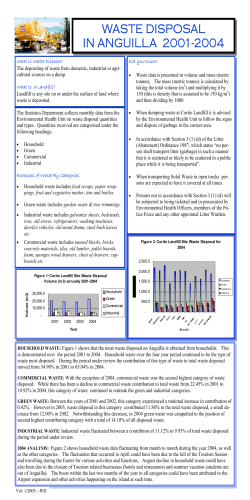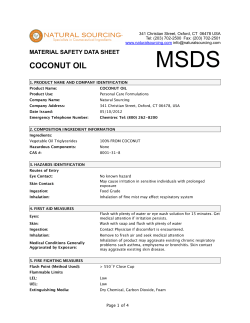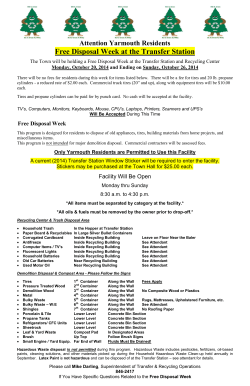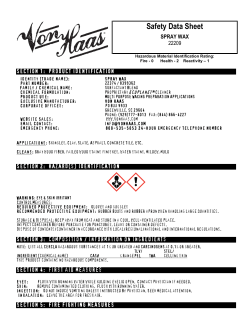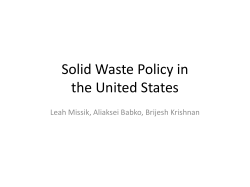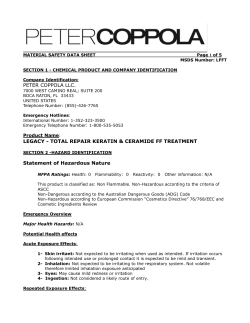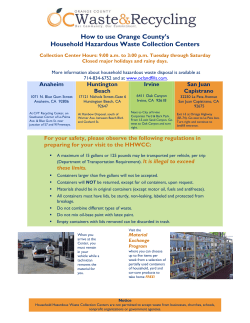
HOW TO... Manage Your Waste
HOW TO... Manage Your Waste How to...Manage Your Waste The cost of sending waste to landfill is increasing, as are the restrictions on what you can send. You can also face penalties if you do not handle waste appropriately or have the correct paperwork in place. What is waste? The Waste Framework Directive defines waste as: “any substance or object which the holder discards or intends or is required to discard.” Essentially this means ‘anything that you need, or want to get rid of’! Once it falls into this category, various pieces of legislation apply. The list below provides a brief overview of the main pieces of legislation. A full list can be obtained from the Environment Agency (http://www.environment-agency.gov.uk/business/142627. aspx) • The Controlled Waste Regulations (England and Wales) 2012 – defines categories of waste. • The Waste Regulations (England and Wales) 2011 – requires businesses to apply the waste hierarchy (see below). • Site Waste Management Plan Regulations 2008 – requires construction projects valued over £300,000 to prepare a waste plan. Additional controls are in place for projects over £500,000. Note – it is anticipated that these regulations will be scrapped as part of the Government’s Red Tape initiative. DEFRA intend to consult on the proposal in December 2012, with a decision required by October 2013. • Hazardous Waste Regulations 2005 – defines hazardous waste and the requirements for its storage and disposal. • List of Waste Regulations 2005 – classifies waste in accordance with a 6 digit code. This code is required on all waste transfer notes and consignment notes. • Control of Pollution Act 1989 – Requires carriers of waste to register with the Environment Agency. • Duty of Care Regulations 1991 – Puts the onus on the owners of waste to confirm that waste is being carried by a registered waste carrier and is disposed of at a licensed disposal or recycling facility. Requires a waste transfer note for the movement of waste. Waste Management Options Deciding what the best waste management option is for your business is best determined by using a Waste Hierarchy: Most favoured option Reduce lowering the amount of waste produced Reuse using materials repeatedly using materials to make new products Recycle Recovery recovering energy from waste Landfill safe disposal of waste to landfill Least favoured option • Reduce - the most cost-effective option is to cut the amount of waste you produce in the first place. This will include better management of your resources e.g. avoid over-ordering and ensuring adequate storage to prevent damage. • Reuse - products and materials can be reused by your own business or by another organisation. • Recycle - this ensures that benefit is still gained from goods and materials that have reached the end of their useful life. • Recovery - some facilities use waste to generate energy or produce biofuel. • Landfill - the least sustainable option is to bury waste at landfill sites or burn it without recovering energy, as these do not lead to any benefit from the waste. It is a legal requirement that you declare on your waste transfer note or hazardous waste consignment note that you have applied the above waste management hierarchy. “ Our environmental policies are woven into how we do business. ” Paul Johnson, HSEQT Director, The Carey Group Reducing, Reusing and Recycling Waste Tips for REDUCING waste: Look for easy wins - such as printing and photocopying double-sided, refilling printer cartridges and using rechargeable batteries. Procure and store carefully – carefully plan your job so you only buy what you need. Buying in bulk can save money and reduce packaging and delivery but ensure you have sufficient space to store the materials correctly to prevent damage. Ensure that equipment and materials are used efficiently. Tips for REUSING waste: Reusing waste in your business The goods and materials you can reuse will depend on your type of business. Think outside the box about how unwanted products can be used in other parts of the business. Why not set up a campaign to get your staff involved in generating the ideas? Reuse by other organisations You can offer waste materials, second-hand products, end-of-line products and obsolete equipment to other organisations that can use them without alteration. Industrial symbiosis brings together organisations that can reuse each other’s waste and resources. WRAP (Waste and Resources Action Plan) has developed the world’s first industrial symbiosis initiative which now has over 12,000 members. For more information, look at their website: http://www.wrap.org.uk/content/industrialsymbiosis-uk Tips for RECYCLING waste: Recycling opportunities are available for many waste products. Work with your waste contractor to see how they can help you. Easy wins include: DD DD DD DD DD DD Inert spoil Paper and Cardboard Toner cartridges Most plastics and metals (including from construction sites) Concrete Timber Sometimes on construction sites, space presents problems when it comes to segregating waste. In most cases your waste contractor will be able to sort all recyclable wastes on your behalf, meaning there will only need to be a small disposal unit on site for those items that cannot be recycled. Your waste contractor will also be able to advise you on whether they have the ability to RECOVER any energy from the waste you dispose such as from incineration or anaerobic digestion. DISPOSAL should be the last resort but in some cases it is the only option; make sure you have considered all other elements of the waste hierarchy first. Landfill is expensive, currently at £64 per tonne (2012-2013), rising by £8 a tonne per year until at least 2014. Landfill tax for inert or inactive waste is £2.50 per tonne. Separating and Storing Waste Separating and Storing Waste You should check whether you need a permit or exemption if you are storing your own waste for recycling or disposal. For more information on permits and exemptions, refer to the Environment Agency webpage: http:// www.environment-agency.gov.uk/business/topics/permitting/default.aspx. Check if you have hazardous waste Hazardous waste may be harmful to human health or the environment. It needs to be segregated from other types of waste and stored securely. Prevent pollution during storage and transport You must prevent waste from escaping and causing pollution. Take steps to prevent: • Leaks from storage containers and tanks • Wind-blown litter • Waste escaping during transport DD Store waste in areas that can contain a leak or spill and are isolated from surface water drainage systems. DD Label containment areas or bins for different materials and activities. Consider using colour-coding for quick identification, e.g. red for hazardous waste. DD You will need to agree with your waste management contractor how you separate your waste for collection. “ The company is actively commited to the reduction of waste and improved operational efficiency. ” JP Dunn Waste Management - Top Tips Waste Management – top tips DDSign up to ‘The Halving Waste to Landfill Commitment’ which was designed by WRAP to provide a supportive framework to encourage the construction industry to work together to reduce waste. Signing up formalises your commitment to embed sustainable policies and practices, as well as to measure and report your success. Not only will it offer you plenty of support for reducing your waste but also demonstrates to external stakeholders that you are serious about reducing your impact on the environment. More information can be found on the WRAP website: http://www.wrap.org.uk/category/ initiatives/halving-waste-landfill DDPLAN – at the start of your project identify the types and approximate quantities of waste you anticipate will be produced. Consider what could be eliminated and what could be segregated for reuse (either in house or externally) or recycled. For contracts valued over £300,000, there are specific requirements relating to this plan in the Site Waste Management Plan Regulations. These Regulations are currently in consultation, with the anticipated outcome being that they will be revoked. However, there are still many benefits of planning for waste management, both environmentally and financially. BRE and WRAP currently offer free online waste planning tools which are available from the following websites: http://www.smartwaste.co.uk/ index.jsp and http://www.wrap.org.uk/content/site-waste-management-plans-1 DDMAKE FRIENDS WITH YOUR WASTE CONTRACTOR – they are the experts so should be able to advise you on the best options for each of your waste streams. If they can’t, shop around. DDMONITOR – how much you are producing and what disposal methods you are using. This will enable you to see where improvements can be made or more importantly, how much you have saved by being wastesavvy! Take the next step If you would like to find out how the Environmental Management System standard ISO 14001 could help improve waste management in your business, then please contact Tracey Stafford on 07703 186974 or email [email protected] To find out more about how Exemplas can provide your business with the support it needs to drive performance, call 0845 600 9130 or email [email protected] Driving your business performance For over 20 years, Exemplas has provided more than 100,000 organisations with solutions that secure exceptional results. Our education, support and consultancy services improve performance, create employment opportunities and deliver the skills necessary for continued success. Telephone: 0845 600 9130 Email: [email protected] www.exemplas.com As part of the University of Hertfordshire Group, we have unrivalled access to a leading resource of world-class expertise, educational solutions and business support. This means we have the people and programmes required to ensure your organisation achieves its potential. Whatever your sector and goals, Exemplas will not only work closely with you to define your ambitions and provide innovative, bespoke solutions. We will do whatever it takes to provide outstanding results for your business. Part- funded by “This project has been delivered with support from the CITB Growth Fund, which aims to ensure that the construction industry has the right people, with the right skills, in the right place, at the right time and is equipped to meet the future skills demands of the industry.”
© Copyright 2026
